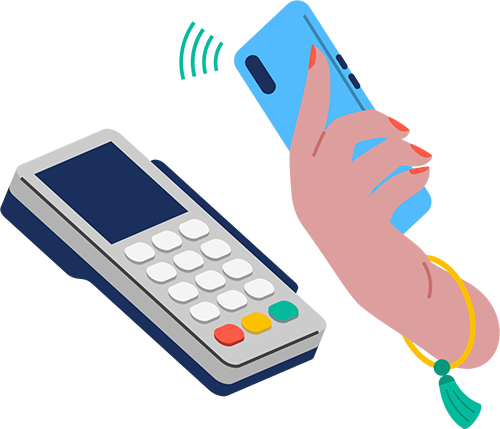
Whether you are just starting out and ready to choose a point-of-sale system for your business or looking for something new, choosing a POS is a big decision. After all, this is an important technology that you will use to run, manage and grow your business. There are so many options out there. Here are a few things to consider to start.
What is a POS (point-of-sale system)?
A point-of-sale system is a machine you use to ring up sales at your business. It’s your cash register, but far more advanced. Like so many things these days, your POS is connected to software; this allows it to record sales, process payments, issue receipts, and do many more functions related to running your business.
How does a POS work?
A POS is made up of hardware and software that work together to accept payments from customers and keep track of sales.
Hardware
Your POS has several physical components, including the digital display, the credit card reader and receipt printer. Depending on what and where you’re selling you may have a barcode scanner and a cash drawer.
If you have a small store or coffee shop you may have just one terminal. If you’re running a food truck, you may primarily use your mobile phone. In a larger restaurant or if you have more than one store you’ll need to plan for multiple terminals.
Software
The hardware system is all driven by the software. The core software makes it easy to enter the items being sold and take payment. This software runs the digital display, checks the validity of your customer’s credit card, and triggers a receipt to be printed.
In addition to the core software part of your POS system, you can expand the capabilities and connections through additional integrations and apps.
5 things to consider when choosing a POS for your business:
1. Cost
There are several common ways that POS systems charge:
- Upfront fee – this is the cost for the machine and setup.
- Subscription fees – monthly recurring fees for the software.
- Transaction fees – usually set as a percentage of your sales.
Understanding your total costs and calculating the best fee structure for your business will depend on the number of terminals you require and the volume and average price of your sales.
2. Compatibility and features
Every POS will allow you to ring up a sale and process payments. Make sure your POS is compatible with the systems and processes you use within your business.
For example, if you sell bundles or need details about the size or other variation, make sure your POS lets you enter those details.
Some POS systems have been explicitly developed for specific industries and will likely fit you better because they know the common configuration challenges. For example, Lightspeed works well for bike shops, and Toast and Table Needs each specialize in restaurants.
3. Support
Before choosing a POS, take some time to learn what kinds of support you can expect from the POS. Some provide a written manual or online tutorials. Some offer a toll-free support number or have an active online community.
If you find a POS with a track record of being easy to set up and easy to use, you shouldn’t need these resources but when you want help, you want to know how to interact with your POS company.
4. Cloud-based
The software that runs your POS can be cloud-based or installed locally on your device or server.
Cloud-based POS systems run off the internet, and you pay a subscription fee for the software. Alternatively, you can install the software ‘on-site’ on your device or server. With on-premise software, you typically pay a one-time licensing fee. Then you’re in charge of maintaining and updating the software, which may be too complicated for some business owners.
There are several benefits to a cloud-based system. Updates are made easily and automatically just downloading the latest version. Also, you can access the software from any internet-connected device so you can check in on business from anywhere.
5. Available apps and integrations
Beyond the essential ability to ring up sales, your POS system can integrate with other software that will help you run your business more successfully. For example, you may want to connect your POS to a ticketing system, an inventory management system, or even have your POS calculate and pay your sales tax automatically.
Finding the right POS for your business
Investing in the right point-of-sale system can really benefit your business, and the wrong one can be frustrating for you and your team.
Spend some time thinking about what’s most important to you and your customers. Do you need to upload an extensive catalog of products automatically? Do you want insights into your most profitable hours? Do you want to make it easy for your customers to add a tip?
Consider which features you’ll really use and would add value to your business. And don’t forget to tap your network of like-minded business owners to learn what has worked for them. Good luck!
